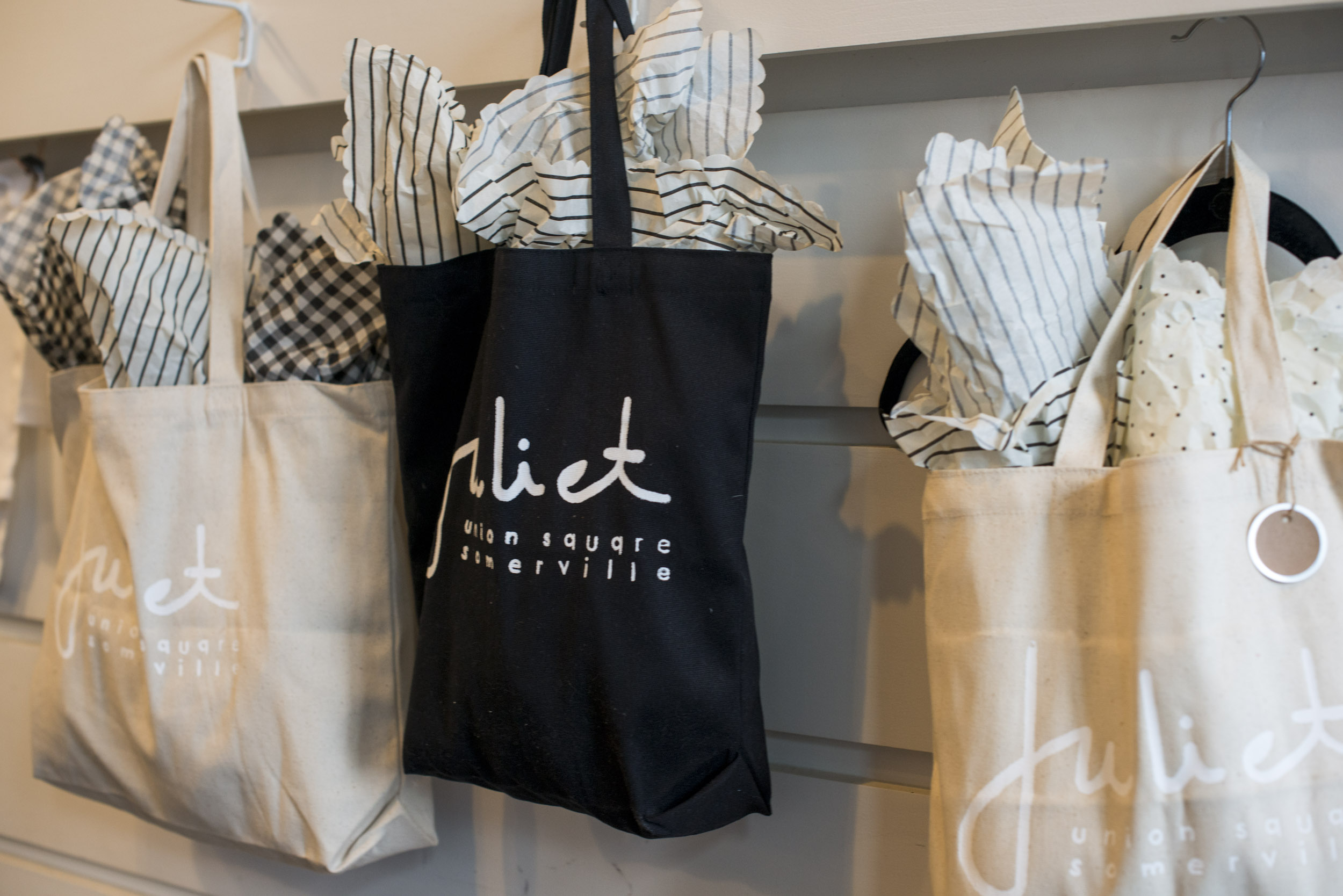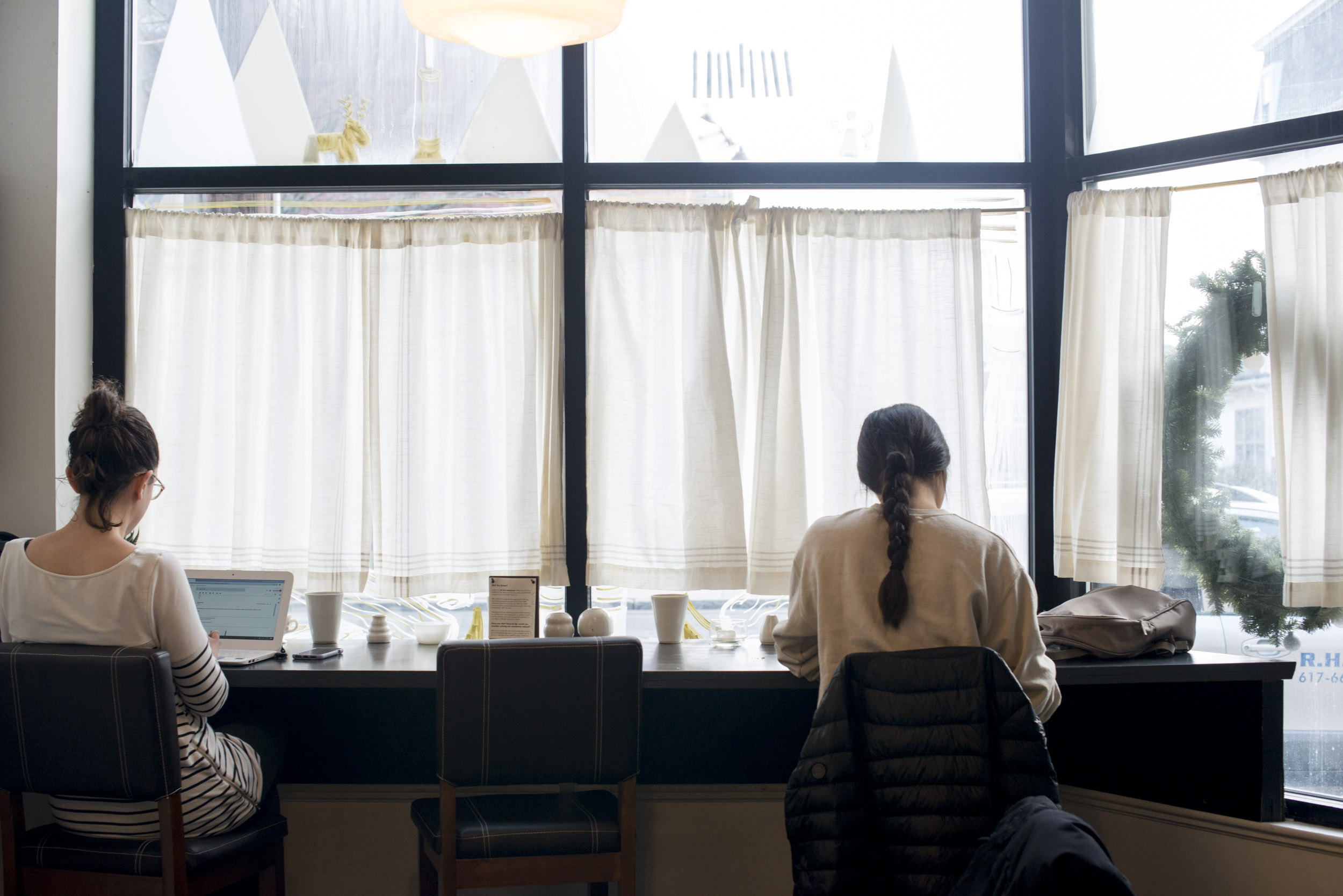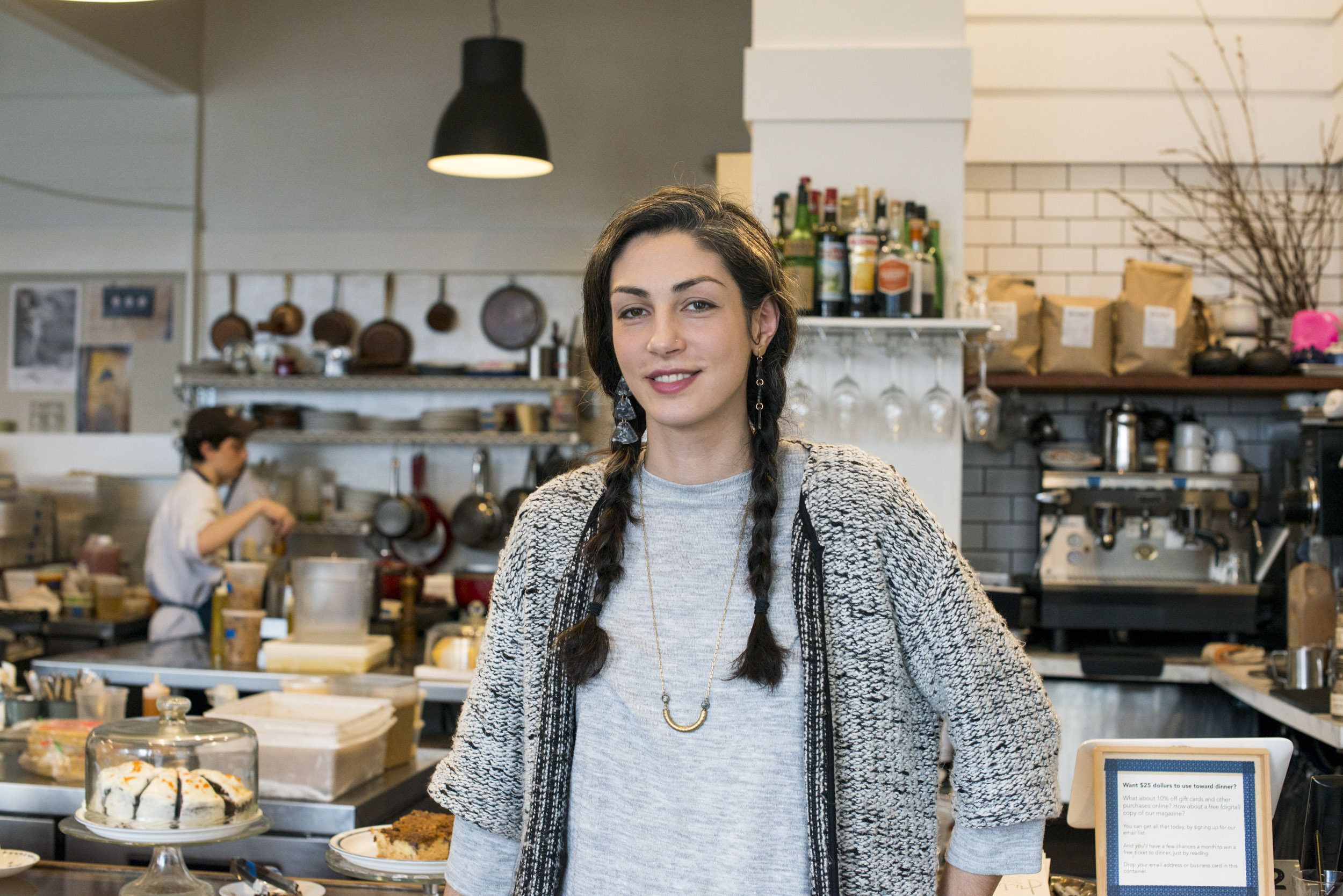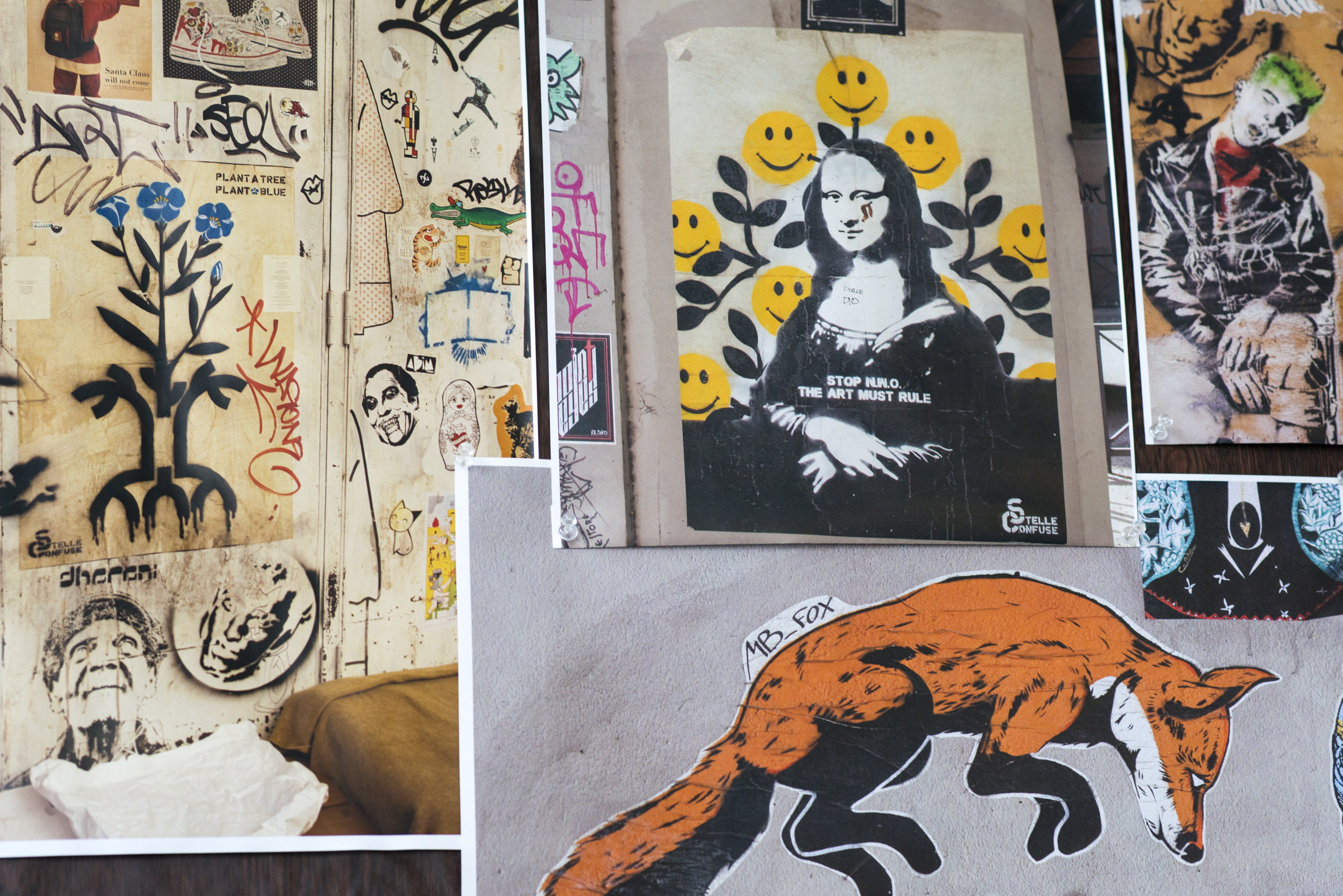Katrina Jazayeri

Katrina Jazayeri
Photograph by Lydia Carmichael Rosenberg
When starting a business, it can be hard to let go of every small detail and see the big picture. But by setting out to change the way a restaurant could be run and building a team that is just as invested, literally, in the success of the business as its owners, Katrina Jazayeri has—along with her partner, Josh Lewin—found a way to step back. Juliet, located in Union Square in Somerville, offers a new way to look at food, community, and profit, as well as amazing dining experiences that never fail to surprise. Find out what a typical day for Katrina looks like, from time in a home art studio to living in the moment during dinner service.
9:00 AM
In an ideal world, I usually wake up around 7:30. In reality, when I work dinner the night before, it’s more realistic to say 9AM. Now that we have a team that can really handle the operations of the restaurant during the day without me and Josh being there, my day starts with administrative work.
10:00 AM
I am not the best emailer—I find it taxing to keep up with email, so I try and carve out a certain time. Not each day, because I like to group my tasks. I find that I’ll sort of look at my whole week and say like, okay Tuesday will be my email day, Wednesday is going to be my “hands on” day; I’m going to make an apron or I’m going to engrave my cutting boards, make the menus, design the art that decorates the restaurant. And then I’ll have a day where I start with invoices, and pay all the bills and payroll. Within each week, I have certain things that serve as nice benchmarks. One of my favorite things is going to pick up the cheese selection for the week, and I get to go and visit my old boss and mentor Liz Vilardi at Central Bottle. That’s usually a Friday thing, because I like to build in a fun treat.
So, my morning is a combination of admin time and time in my home studio, where I make my aprons, screen-print the t-shirts and bags for Juliet, do that kind of thing. When I was applying to colleges, I applied to half liberal arts and half design/fashion programs. I started making clothes when I was around twelve. I’ve always been a very tactile person—anything I can kind of make with my hands I’ve enjoyed. I started the apron business as a side project when I was working at Belly and The Blue Room, to provide a functional apron for people after seeing that everyone’s always modifying their apron, because it never fits the way you want it to or has the right pockets in the right places. That was a way of getting that little bit of creativity into my daily job.
What are you most proud of at Juliet?
I think being the first restaurant in Boston to eliminate tips. We’re still only one of two or three places that do that, and it’s still early days, but we set out to create a business that could be tip-free and viable in this market, where no one else has to pay above tipped minimum wage to their servers. I’ve enjoyed being able to lead the charge in restaurants talking about labor issues and wage inequities and what that does in terms of sexual harassment and advancement (or not) of the team. Initially, people would say, “oh what is this model?” but as soon as we explained they would say, “this is great, we wish other people were doing it.” There’s still a lot of structural barriers to having this really catch on. We realize that we are a small test case and it’s unique in that we basically built our restaurant to sustain this model, rather than trying to retrofit it around something that already exists.
The other thing that I am most proud of is that we’ve been invited into the conversations about what sustainability looks like from a human perspective—what does a sustainable career look and for whom is it accessible. I am proud of being able to share our story and hopefully inspire that next person to start their business a little differently, or to think about how putting people first can benefit themselves as well as their broader community. That is the most inspiring thing and the thing I’m continually proud of. And with that intention, we’ve also won acclaim for the restaurant itself. Because we started our restaurant with this intention, we’ve attracted a team of people who are equally invested in changing the future of this industry. We joke about having our own rebel alliance. We’ve talked about tattoos. Being around people who are pushing me to think about the next problem to solve, or how we do a better job and provide more access and achieve more career advancement—I don’t have to be the only one pushing that agenda. We’ve attracted a team of people who really want to make it happen with us, and that’s what it is going to take.
Having the restaurant is like this great outlet for all of the things that I’ve done in life up until this point, but never made the career move to do. Which looking back makes a lot of sense; I wanted to be everything from fashion designer to architect to epidemiologist, all of these different things. I’ve pulled a part of those jobs into running a dynamic business because it has a visual element, it has a food element, it has a position inside of an economy and the choice and the power we get in terms of where we buy from. Having a business has allowed me to incorporate all of those loves that I was never—I don’t want to say confident, I think that’s the wrong word—but I was never so singularly committed to each one of them to say, “I’m doing that.” That big leap was saying, “I’m opening a business and I’m going to take on all of that it is to run and operate a business and then build in the things that I love to do.” Right now, my newest hobby is woodworking, so I’ve made cutting boards. It makes sense with the restaurant, but also lets me make something that I love.
I’ll do most of that at home, because once I get to the restaurant, I am pulled in many directions, for better or worse, and endless numbers of the best sort of distractions. That means that anything that happens after I get to work from an administrative perspective becomes optional. If I get to it, great, but if ten of our regulars are in the restaurant, then I’m going to be chatting with them and catching up.
4:00 PM
Unless I’m here redecorating the restaurant, which happens every time we change the menu, I will get in around 4. I check in on the wine orders for the week, do some reorganization, look at the menus and see what we’re changing. I also plan our pre-meal service—what elements are we going to talk about with the team, because we have the most amount of people together as we go into dinner. We talk about something service related, something food related, and also something “open book,” because we have the open book management model, so we try to bring that into each day’s service in some small way before we set out to begin our shift.
It’s getting to dinner time, so we convene with the team, we share a meal together, and then at this point dinner service begins.
6:00 PM
During service, I can be the bartender, as well as the manager and the “wine lady.” I’m not a sommelier so I don’t call myself that, but I’m the one who is “in charge of drinking,” as Josh would say. I will do all the wine pairings and add that extra touch to the dining room. And then other times I am the server (I will still fill in those shifts) and I really love that—I love the immediacy and how it’s an extension of the dynamic nature of the restaurant, where any number of things could happen in that service, and you’re in the moment. At five o’clock, I’m not thinking about the emails I didn’t answer, or what needs to happen tomorrow. I’m moving purposefully, making relationships and being part of this dance that I think is really cool. Service goes from six to eleven.
Photographs by Lydia Carmichael Rosenberg
11:00 PM
Once the last guests leave, we wrap everything up, we clean the restaurant, I sit down with the notes from the day, looking over what went on during the cafe service, ask what the chefs have to say about how the service team was working, find out what do we need to order, and what tomorrow is looking like. I then transform all of that information into communication with the broader management team so that everyone has the benefit of knowing what went on during a shift that they weren’t a part of. Especially as we train new members of the team and we take a step back from the day-to-day operations, sharing that mentorship is a way we can always be involved, even if we aren’t physically in the building. That forethought of, “we’re going to need to step back soon so that we can create opportunities for the rest of our team to grow and keep moving up,” was not part of our days even nine months ago. It requires us to be less present, or at least present in a different way, which is a new and exciting challenge.
Juliet is not so much like a co-op, where people have to buy in and then own things equally, but it’s a workplace where everyone on the team gets to help with decision making in the restaurant as well as having an understanding about how the day to day work affects different lines on the P&L. Together we set goals about cost, revenue, overhead and things like that, and then depending on how successfully we meet or in most cases exceed those goals, we make profit. That profit is then shared equally among the team. We thought it was important to make it accessible, to be able to have a job that looks almost like any other restaurant job, except that there is this layer where you can actually learn about how a business works, because maybe you want to run a business someday. Or even if you don’t, we recognize that your opinion is important, the way you do your work is meaningful and useful to the team, and that we’re interested in how making your job better and easier actually benefits the business overall.
What was your biggest challenge starting Juliet?
I think the hardest thing about opening was the uncertainty and lack of transparency in the process that we needed to go through to actually open a business. Things like licensing, the dialogue about a creative concept and what should it look like, and the hoops to jump through. We didn’t know how to plan for X,Y, and Z that needed to be decided and then communicated with our contractor, who speaks a “contractor language” that we didn’t speak. Very little of our previous experience had trained us for that component. That was hard because it was outside of our control, completely, whereas other challenges were hard, but we were in control of them. Getting a liquor license and being caught between all of those processes that feel like really established bureaucracies—what I learned was that there are actually a lot of things that are more ambiguous than you’d think. And that is where the difficulty lay for us—you get one answer from one place and a different answer from another. I am not the kind of person who says, “it’s easier to ask for forgiveness than permission”—I want permission to do it, at least when it comes to some things. When it comes to a business that will employ other people, I don’t want to mess around with any of that.
Something that I try to be aware of is that a business can change the relationship its employees have with work, even if the individual’s goals are not to become like you as the owner of that business. That doesn’t change the fact that having respect and dignity, having a voice, and being acknowledged is important. You have a brain that you can use towards helping the business, and it is so often wasted as a resource.
We also try to not to look at everything as altruistic because at the end of the day we want to have objectively great food, great service, and we want to be a profitable business. What we’re looking for are those intersections where the right thing to do is also the profitable thing to do. We define profit as more than just money, but also the health of our employees, our community, and our environment. I’m actually wasting a resource if I’m not asking my team how a system could be better. If I try to keep all of this decision making for myself, then I’m neglecting 20 other minds that could have already solved the problem. I think it’s important to listen to those around you and learn from their experiences.
We encourage everyone on the team to keep a notebook to note all the things where something happens that might be weird or different, but that they can’t discuss during service. At the end of the night, we’ll check in with the team to see if there’s anything they want to add to the communication sheet for the day. That’s also part of the accountability and empowerment for the team. At the end of the night, you have this energy from being busy and having completed something, so I think it is a moment of creativity, too.
~As told to Lydia Carmichael Rosenberg/The Thirty-One Percent
Follow Juliet on Instagram and visit their website to book your reservation - upcoming menus inlude Tracks North: cuisine Quebecoise starting February 20, and on March 20, Nowruz: a Persian New Year (act fast, this menu has been a tradition for seven years and will only run two weeks!)









